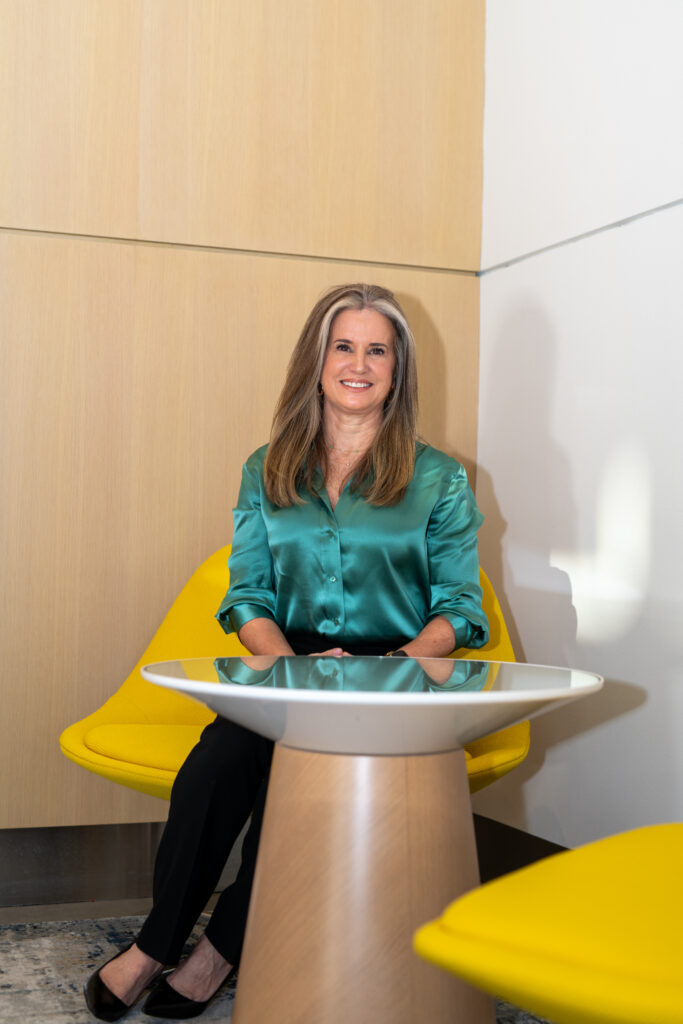For Premium Subscribers
She’s handled pro bono cases for the Dallas Volunteer Attorney Program for 20 years. She sits on the board of a very large foundation. She’s led a series of successful fundraisers, her most recent a record-breaking $1.3 million. She’s helping kids afford college at her alma mater. She saved a rescue dog named Ricky Bobby who does not have chemical burns, but does have bad skin.
Oh yeah, and her day job is general counsel of the country’s largest television station owner. But Nexstar Media Group’s Rachel Morgan has traveled down a long path to get to where she is today, hustling every step of the way.
The Lawbook talked with Morgan about attorney participation in pro bono, what she looks for in outside counsel, how she prefers outside firms staff her matters and the most important thing for doing pro bono well.
Texas Lawbook: What has been your best day working at Nexstar Media?
Rachel Morgan: Hard to choose a “best” day. The first day was special — it was the culmination of 25 years of work to finally ascend to the “top job.” Over the past year and a half, there have been many great days. The team is amazing and so they accomplish incredible things all the time. Impossible to pick. But my first board meeting in L.A. was exciting and glamorous.
Lawbook: What are the biggest pro bono challenges facing the legal profession today?
Morgan: In Texas, attorney participation in pro bono is not required as it is in other states. This creates a challenge — getting busy attorneys to voluntarily take time out of their schedules to provide legal services for free. Some firms and some companies are better at incentivizing and rewarding pro bono work than others, but for most folks, pro bono work is a low priority. And it should be the highest priority work that we do.

Lawbook: When it comes to DEI, how do you want your outside firms to approach staffing the teams handling your legal work?
Morgan: I don’t care as much about, ‘Is it this percentage women, is it this percentage minorities, or is it this percentage LGBTQ?’ I don’t care as much about those labels as I do about demanding of the partners who work on our matters to find those associates in their firms who have been denied opportunity — if it’s because of their circumstance, if they’re a little rough around the edges, if maybe English is their second language and so they’re just not the person that everybody goes to as sort of the shiny star associate.
I want those people working on Nexstar’s matters, who are hungry for the relationship, who are willing to learn, who are humble. I don’t need the superstars all the time. Not every matter deserves platinum-level service. Ninety-nine percent of the time the business gets it right. And the lawyers are just a little safety net. And the problem becomes when the lawyers make themselves more important than the business.
Lawbook: For the firms that you’ve noticed doing pro bono well, what are some specific things they do that you think help them pull it off?
Morgan: The only thing that helps them pull it off is having individuals in their organizations that personally feel passionate about it. You have to have the people who care.
I think the big firms do a pretty good job. I would be curious to see how that translates into partnership promotions. I sometimes get the sense that the people who emphasize doing pro bono and community work are not necessarily the ones who are identified for promotions, and I think that would be an area where firms could probably do better in terms of how they’re evaluating their talent — putting as much of an emphasis on pro bono and community engagement as they do on billable hours and rainmaking. I realize that’s not terribly realistic, but I think that would be good.
There are certain firms that really just distinguish themselves by their commitment in terms of the number of hours that they give to pro bono. Frankly, that makes a difference to me when I’m hiring firms. I want to throw those firms as much business as we can, because that means our values are aligned and that’s important.
Lawbook: What are some other factors you consider when deciding who to hire as outside counsel?
Morgan: I’m most interested in practical, creative, quick advice. I rarely need platinum-level memos, but I often need a quick and dirty answer. My pet peeves are attorneys who spot issues but don’t provide solutions or show no appreciation for the practical realities of our business. I look for value, expertise and diversity in an OC team. Above all, relationships are key. I want to work with people I trust and like. So, it helps to be a straight shooter with a good personality and sense of humor.
Lawbook: What does outside counsel need to know about you?
Morgan: Please give me brevity. I’ll ask for more if I need more.
Click here for the full profile of Rachel Morgan.
